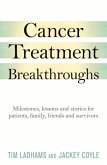Understanding Cancer: Causes, Types, and Treatment OptionsCancer is a complex disease that affects millions of people worldwide. In this subchapter, we will delve into the fundamental aspects of cancer, including its causes, various types, and the treatment options available. By understanding the intricacies of this disease, we can gain valuable insights into how technology has revolutionized cancer therapy.To comprehend cancer, it is crucial to explore its causes. While genetics and family history play a role in certain cases, it is important to note that anyone can develop cancer. Lifestyle factors such as smoking, poor diet, lack of exercise, and exposure to harmful substances can significantly increase the risk. Moreover, certain infections, such as Human Papillomavirus (HPV) and Hepatitis B and C, are known to be linked to specific types of cancer.Cancer manifests in numerous forms, each with its own unique characteristics and treatment requirements. Common types include breast, lung, prostate, colorectal, and skin cancer. Understanding the distinctions between these types is crucial for accurate diagnosis and effective treatment.Advancements in technology have brought forth a multitude of innovative treatment options for cancer patients. Traditional methods such as chemotherapy and radiation therapy are still widely used, but new techniques like immunotherapy, targeted therapy, and precision medicine have emerged as promising alternatives. These cutting-edge treatments harness the power of technology to specifically target cancer cells while minimizing harm to healthy tissue, leading to improved outcomes and reduced side effects.Technology has also played a pivotal role in cancer detection and diagnosis. Advanced imaging techniques, including Magnetic Resonance Imaging (MRI), Computed Tomography (CT), and Positron Emission Tomography (PET), enable early detection and accurate staging of cancer. Additionally, liquid biopsies and genetic testing have revolutionized the field of personalized medicine by allowing doctors to tailor treatment plans to an individual's unique genetic makeup.
Hinweis: Dieser Artikel kann nur an eine deutsche Lieferadresse ausgeliefert werden.
Hinweis: Dieser Artikel kann nur an eine deutsche Lieferadresse ausgeliefert werden.








